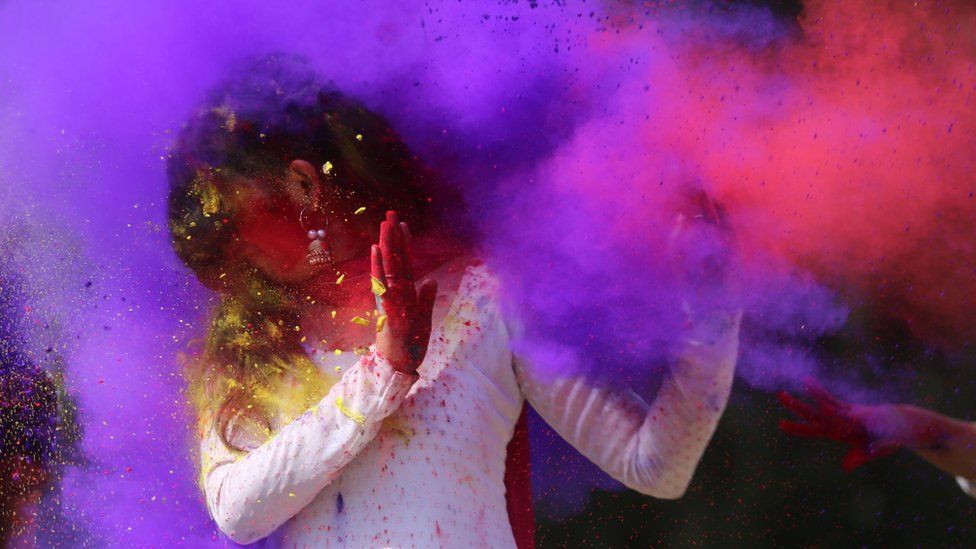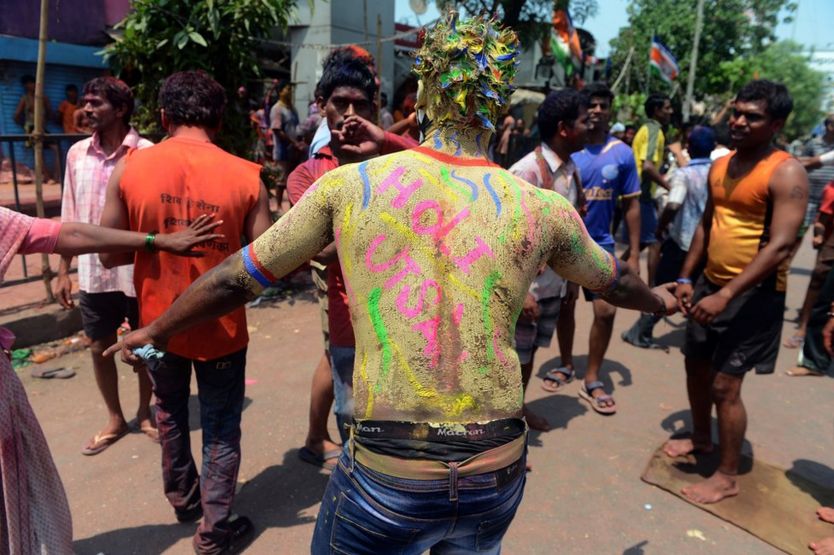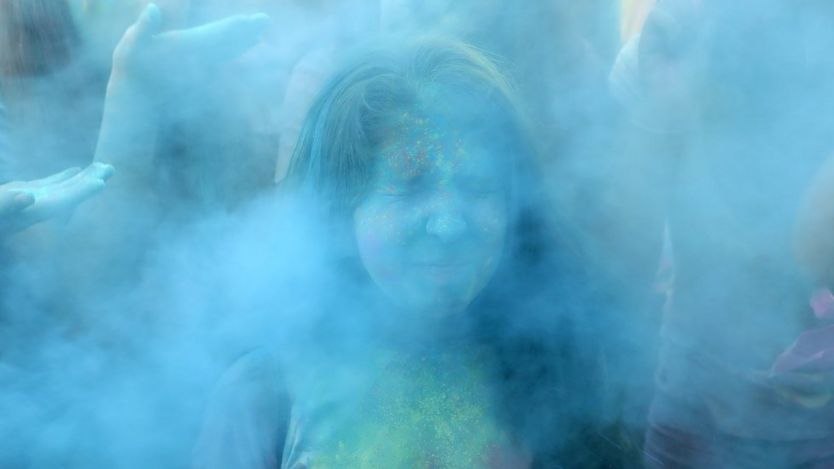- Joined
- Dec 31, 2015
- Messages
- 1,889
- Points
- 83
https://sg.theasianparent.com/holi-in-singapore/
http://www.bbc.com/news/world-asia-india-43252444
India female students take on 'Holi harassment'

Image caption Women say Holi is used an excuse by men to harass women
Female students in India's capital Delhi are protesting against harassment during the popular Hindu festival of Holi. The BBC's Nikita Mandhani spoke with them about their experiences.
Holi, a spring festival, is celebrated in many parts of India by people throwing coloured powder and water at each other. But some women say their experience of the festival is far from the romantic representations promoted by Bollywood and tourist accounts.
"As you grow older, Holi becomes the time when you start realising that your body is an object," says Gurmehar Kaur, a student at Delhi university.
Several female students at the university told the BBC that they are scared of walking on the streets near their college campuses around Holi because they are hit by water balloons, m&d or eggs.
A few days before the festival, Avidha Raha, was travelling in an auto rickshaw when a liquid-filled balloon hit her in the chest and exploded.
"I don't know what it contained; it was sticky and slimy," Ms Raha says. "I felt disgusted."
When she heard stories of students who had been attacked with "semen-filled" balloons, she soaked her t-shirt in water for two days.
Another student, Tolino Chishi, posted on Instagram on 27 February, claiming that someone had thrown a "semen-filled balloon" at her. The post went viral, triggering a few anti-harassment protests within and around the Delhi University campus.
While it's unclear how the students knew that the substance in these balloons was semen, being hit by balloons filled with coloured water is not new.
"On my way back from the protest, I was hit by a water balloon," says Raginee Samarah. "There were two boys on a bike who sped off after doing that."
None of this is limited to Delhi. Women in cities and villages across northern India are anxious about leaving their homes during Holi. The day is often used as an excuse by strangers - mostly men - to smear them with colour or throw water at them. People often drink "bhang", a liquid form of cannabis, on Holi, increasing the chances of women encountering groups of intoxicated men.

Image caption Women are often scared of encountering groups of intoxicated men on Holi
Women who spoke to the BBC said they enjoy celebrating Holi with family and friends and embrace the joy that surrounds it. But they added that some kinds of behaviour under the guise of celebration was still unacceptable
"You cannot just throw anything and everything on strangers without their consent and say - bura na maano Holi hai (Don't feel bad, it's Holi)," Ms Raha says.
Ms Raha and others have filed a police complaint against men who have been flinging balloons at women for more than a week, leading to police patrolling the area around the campus.
"There is rampant normalized everyday sexual harassment in the name of culture," says Avantika Tewari, an alumna of Delhi University. "Whenever you try to raise a demand of security on campus, the institutions impose more regulations on you."
Ms Tewari is a member of a collective that has been protesting against different hostel deadlines for men and women - some women's hostels lock their gates as early as 6:30pm, forcing students to return by then.
But campaigners such as Ms Tewari say that the idea that enforcing such deadlines will keep women safe is flawed.

Image caption Incidents of harassment increase during Holi, according to a study
"There's been a long history of harassment around Holi," says Janaki Abraham, a former student who is now a sociology professor at the university.
Ms Abraham was part of Delhi University's Gender Study Group which released a report in 1996 pointing out that incidents of sexual harassment peaked during Holi. The report said 60.5% of the women staying on the campus that year complained of aggravated harassment around Holi.
She added that this year's incidents and protests gave her "a sense of déjà vu".
"University hostels always responded by locking up the women," she says. "In a sense, nothing has changed."
Many women agree that college campuses are safe spaces for female students and that the police have been supportive. But they also say that hasn't deterred men who harass women outside campus in the name of celebrating Holi.
"Police should make sure boys who perpetuate this sort of harassment don't get away with it," says Ms Kaur.
But, she adds, the root cause of harassment is yet to be tackled.
"It's really important to teach boys that if someone doesn't want to play Holi with you, you cannot attack them with colours and balloons without their consent."
Additional reporting by Sindhuvasini Tripathi
http://www.bbc.com/news/world-asia-india-43252444
India female students take on 'Holi harassment'
- 2 March 2018

Image caption Women say Holi is used an excuse by men to harass women
Female students in India's capital Delhi are protesting against harassment during the popular Hindu festival of Holi. The BBC's Nikita Mandhani spoke with them about their experiences.
Holi, a spring festival, is celebrated in many parts of India by people throwing coloured powder and water at each other. But some women say their experience of the festival is far from the romantic representations promoted by Bollywood and tourist accounts.
"As you grow older, Holi becomes the time when you start realising that your body is an object," says Gurmehar Kaur, a student at Delhi university.
Several female students at the university told the BBC that they are scared of walking on the streets near their college campuses around Holi because they are hit by water balloons, m&d or eggs.
A few days before the festival, Avidha Raha, was travelling in an auto rickshaw when a liquid-filled balloon hit her in the chest and exploded.
"I don't know what it contained; it was sticky and slimy," Ms Raha says. "I felt disgusted."
When she heard stories of students who had been attacked with "semen-filled" balloons, she soaked her t-shirt in water for two days.
Another student, Tolino Chishi, posted on Instagram on 27 February, claiming that someone had thrown a "semen-filled balloon" at her. The post went viral, triggering a few anti-harassment protests within and around the Delhi University campus.
While it's unclear how the students knew that the substance in these balloons was semen, being hit by balloons filled with coloured water is not new.
"On my way back from the protest, I was hit by a water balloon," says Raginee Samarah. "There were two boys on a bike who sped off after doing that."
None of this is limited to Delhi. Women in cities and villages across northern India are anxious about leaving their homes during Holi. The day is often used as an excuse by strangers - mostly men - to smear them with colour or throw water at them. People often drink "bhang", a liquid form of cannabis, on Holi, increasing the chances of women encountering groups of intoxicated men.

Image caption Women are often scared of encountering groups of intoxicated men on Holi
Women who spoke to the BBC said they enjoy celebrating Holi with family and friends and embrace the joy that surrounds it. But they added that some kinds of behaviour under the guise of celebration was still unacceptable
"You cannot just throw anything and everything on strangers without their consent and say - bura na maano Holi hai (Don't feel bad, it's Holi)," Ms Raha says.
Ms Raha and others have filed a police complaint against men who have been flinging balloons at women for more than a week, leading to police patrolling the area around the campus.
"There is rampant normalized everyday sexual harassment in the name of culture," says Avantika Tewari, an alumna of Delhi University. "Whenever you try to raise a demand of security on campus, the institutions impose more regulations on you."
Ms Tewari is a member of a collective that has been protesting against different hostel deadlines for men and women - some women's hostels lock their gates as early as 6:30pm, forcing students to return by then.
But campaigners such as Ms Tewari say that the idea that enforcing such deadlines will keep women safe is flawed.

Image caption Incidents of harassment increase during Holi, according to a study
"There's been a long history of harassment around Holi," says Janaki Abraham, a former student who is now a sociology professor at the university.
Ms Abraham was part of Delhi University's Gender Study Group which released a report in 1996 pointing out that incidents of sexual harassment peaked during Holi. The report said 60.5% of the women staying on the campus that year complained of aggravated harassment around Holi.
She added that this year's incidents and protests gave her "a sense of déjà vu".
"University hostels always responded by locking up the women," she says. "In a sense, nothing has changed."
Many women agree that college campuses are safe spaces for female students and that the police have been supportive. But they also say that hasn't deterred men who harass women outside campus in the name of celebrating Holi.
"Police should make sure boys who perpetuate this sort of harassment don't get away with it," says Ms Kaur.
But, she adds, the root cause of harassment is yet to be tackled.
"It's really important to teach boys that if someone doesn't want to play Holi with you, you cannot attack them with colours and balloons without their consent."
Additional reporting by Sindhuvasini Tripathi
